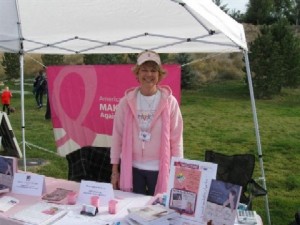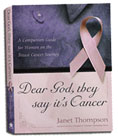This month, along with fall colors, you’ll also see pink splashed across newspapers, blog sites, magazines, kitchen appliances, cars, mayonnaise jars . . . as marketers and opportunists try to take advantage of our compassionate desire to help find a cure for breast cancer during National Breast Cancer Awareness Month. But beware: everything colored pink is not black and white. I have some tips on helping you determine a legitimate pink investment versus a pink opportunist.
While taking my early morning walk and praying for what I should write this month on breast cancer, I felt the Lord prompting me with the title of this blog. At the bottom of our road is a row of newspaper holders, and I finish my walk by getting our paper. I laughed aloud when I saw the color pink filling all the newspaper receptacles. The entire Idaho Statesman newspaper was pink!
“Even the sports page is pink!” my husband exclaimed. A front-page article jumped out at me: “Make Your Donation with Care: That Pink Ribbon Might be Lying; Find the Truth about Breast Cancer Giving.” I knew God was confirming that He did want me to warn about the dangers of scammers hitching up to the October pink bandwagon.
Make Your Financial Donations with Care
“Being a donor is a huge responsibility,” said Lynn Hoffmann, executive director of the Idaho Nonprofit Center. “I think it’s too often that donors do just give because they want to do something, but if they don’t do their homework, those dollars may not go where they want them to go” (Idaho Statesman). If you’re going to make a donation, do a thorough investigation of where the money will be going. Ask some basic questions:
- How much of what I’m giving goes toward the charitable purpose and what is that purpose?
- Is this a nonprofit, tax-exempt organization?
- How much of a donation goes for administration, fundraising, and to the core mission?
- Is the organization truly nonprofit and tax-exempt?
- What are the executive’s salaries?
Question Solicitors
I receive frequent solicitation calls asking for donations to fund breast cancer research or to help breast cancer patients. I always tell them I am a three-time breast cancer survivor and wait to see their response. One sweet woman said, “God bless you and I’ll pray for your future health. We won’t call you again.” But others keep trying to get my money, and that’s when the red flag goes up. Be skeptical of any pushy solicitors.
Ask:
- the name of the charity, website, phone number, and address, and tell then you will investigate and they can call back.
- if the caller is an employee, a volunteer, or a telemarketer, whose company might be the ones banking the donations.
Research Online
Many websites and organizations collect and publish information on nonprofits:
- GuideStar.org collects tax documents on federally registered nonprofits.
- ProPublica is an investigative journalism nonprofit group with an easy to search database at projects.propublica.org/.nonprofits.
- CharityNavigatigator.org rates some nonprofits.
Do some investigating yourself. The foundation or nonprofit asking for a donation should have a website: do they post annual reports? Who are their affiliates or partners?
My husband and I do not want our money going to any organization that supports, funds, affiliates with, or sponsors something we don’t agree with or support. For example, we stopped supporting Susan G. Komen several years ago when we learned that they fund Planned Parenthood. For several years before knowing this, I walked in the Komen races, wore their T-shirts, enjoyed the camaraderie of doing an event with other breast cancer survivors, and have Komen listed under National Contacts in the Sanity Tools of Dear God, They Say It’s Cancer. However, I had not done my homework.
Buyer Beware
KUOW.org points out:
“Susan G. Komen for the Cure is one of the largest breast cancer charities in the world. It partners with corporations to brand pink ribbon product lines for the month of October: pink Purina pet food, pink Yoplait yogurt, and pink buckets of Kentucky Fried Chicken, to name a few.”
When purchasing merchandise with a pink ribbon, ask the merchant: Are you donating any portion of the sale, and if so, to what organization?
I saw an advertisement for a pink/pink ribbon decorated Swifter WetJet with a “Cleaning For A Reason” slogan. They also gave a website www.cleaningforareason.org. At their website, I saw that they had a non-profit foundation and donations go to providing cleaning services for cancer patients. There were testimonials and contact information for further questions. I had no idea this service was available, and it looks like a good one.
But money spent to purchase a pink/pink ribbon Swifter WetJet is not going to the foundation; it’s going to Swifter and the merchant. So if I want a pink Swifter WetJet great; but if I want to donate to cleaning services for breast cancer women, I need to donate to their foundation.
Per Dr. Samantha King, director of Queen’s University school of kinesiology and health studies and the author of Pink Ribbons, Inc: Breast Cancer and the Politics of Philanthropy: Companies who use the Komen name pay Komen up front for the right to put Komen’s pink ribbon and name on their products. So your purchase doesn’t make any difference, nor does a portion of your purchase go straight to Komen. Money has already exchanged between Komen and the business. You can hear an interview with Dr. King at KUOW.org, and Google her name to read more of her comments on “pinkwashing.”
Sadly, there is a rampant marketing ploy of “pinkwashing”—raising the price of a pink or pink ribbon product. The assumption of the consumer is that the extra cost goes directly to fund a breast cancer foundation, but in most cases, it’s just making extra money for the business. If you know this and just want to wear pink, like I do for awareness purposes, that’s fine—but realize that’s what you’re paying for.
Everyone should eat healthy, especially women fighting breast cancer, so beware of foods packaged with a pink ribbon that wouldn’t be good for them (or you). Here are a few I’ve seen who will try to use the pink ribbon to get your emotional purchase:
Sugar—cancer loves sugar
Candy—sugar
Soft drinks—not good for anyone to drink
KFC—really?
I’ve Been Fooled Too
When first diagnosed with breast cancer, I vowed I would not wear pink or a pink ribbon because I didn’t want breast cancer to be my identity. But I soon realized it was my testimony to God’s faithfulness and something I couldn’t deny. So today, as a survivor, pink is my favorite color and I’m proud to wear clothing and jewelry with a pink ribbon—the universally understood breast cancer insignia.
I’m not picking on Komen, or promoting any organization, I just want you to be sure your money and donations are going where you think they are going.
You have to make your own decisions, and I would love to hear some organizations and foundations that you have researched—viable candidates for us to support in the fight against breast cancer. I think we have achieved awareness, what we haven’t achieved is a cure. I feel the answer is preventive research: why is breast cancer so prevalent and what can we do to protect ourselves against this dreaded disease? That’s where I’ll put my money. How about you? What are your thoughts?
______________
Note: About His Work Ministries is not a non-profit, tax-exempt foundation and we do not solicit or receive donations.
Dear God, They Say It’s Cancer: A Companion Guide for Women on the Breast Cancer Journey is the book I wrote to walk alongside my breast cancer sisters.











Janet, thank you for this wonderful educational blog, I hope that it produces a lot of reflection and change in the way people handle donations, not just for pink ribbon causes but in general.
A non-profit organization, Reconstruction Of A Survivor, based in Houston, TX, puts all of the donations it receives into the organization. ROS makes support groups available to breast cancer survivors using a faith-based curriculum. The groups are grant funded. The founder/director receives NO salary. This year it established a fund to assist survivors by providing nominal, need based grants for such things as groceries, cleaning services, tires, medication, gas, etc. . All donations specified for this fund go directly to this fund. Go to http://www.roasurvivor.org to learn more.
Thank you for sharing Wanda. This does sound like a great foundation. I did notice on their website that they partner with Susan G Komen, but it’s good to know that all the funds go to the foundation’s great services for survivors.